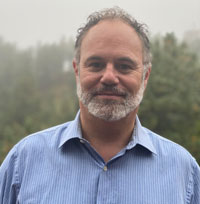From the Editor
Dear Colleagues,
Our 20th Annual Conference is right around the corner.
At a time of tremendous worldwide socio-geopolitical upheaval, we are about to congregate in Mérida, Yucatán, Mexico to immerse ourselves in the myriad ways the notion of “home” shapes our psyche, influences our relationships, and forms our identities. The conference aims to shed light on the profound impact that the quest for belonging exerts on individual and collective psyches, transcending cultural, geographical, and temporal boundaries, all while providing a wonderful opportunity for us to engage in-person (and, for the plenaries, online) with one another.
Conference co-chairs Adriana Cuenca Carrara and Berta Loret de Mola (both of Mexico) and the conference committee have spent a year preparing to offer IARPP members this journey of learning, exchange and enrichment. Conferencegoers will have opportunities to experience the unique flavors of the famed Yucatán Peninsula, which bears witness to one of the most magnificent civilizations in history, the Maya civilization. We will be able to explore this rich culture both through the specially prepared plenaries and parallel activities. Plus there’s a pool.

If you haven’t yet signed up for the conference or its online plenaries, here is a link with information and registration: https://iarpp.ce-go.com/iarpp-conference-2024-mexico.
Before proceeding with a précis of this month’s IARPP Bookshelf contents, I want to acknowledge and applaud our Colloquium Committee co-chairs, Cathy Hicks (Australia) and Shlomit Gadot (Israel) for conceiving, developing, and moderating the just-concluded colloquium, “Why War?” with such care and thoughtfulness. I think many of us were surprised as well as moved by the ways this week-long exploration and meditation on aggression, destruction, hatred, violence, and war developed. Our gratitude to them both.
Here is what you’ll find in this issue of The IARPP Bookshelf:
Concepció Garriga (Spain) has written Los Chicos de la Salut (The Boys of the Salut), an account of the vicissitudes suffered by a Catalan family that took in two brothers whom social services had removed due to neglect. It is a testimonial of both despair and hope: the older brother, diagnosed as schizophrenic, ended up dying at 26; the younger one, having undergone psychotherapy from the age of five, held promise for a healthier fate.
Haim Weinberg (USA) has co-authored The Virtual Group Therapy Circle: Advances in Online Group Theory and Practice to provide group therapists and counselors with the necessary knowledge and guidance to develop their skills in effectively conducting online groups. The book identifies the diverse challenges and suggests solutions in remote group therapy for a wide range of therapeutic approaches.
Sandra Buechler (USA) announces the publication of her eighth book, Erich Fromm: A Contemporary Introduction. Fromm, whose contributions spanned sociology, politics, psychoanalysis, and philosophy, was an ardent activist, social critic, public intellectual, and prolific author. Buechler argues that his cogent, passionate, humanistic approach has tremendous contemporary relevance.
Jill Salberg and Sue Grand (both USA) have recently published Transgenerational Trauma: A Contemporary Introduction, which offers a nuanced and comprehensive overview of the psychoanalytic work on transgenerational trauma. Rooting their perspective in attachment theory and the social-ethical turn of Relational psychoanalysis, Salberg & Grand have developed a cutting-edge approach to trauma transmission across generations.
Brent Willock (Canada) sheds light on Putin’s psychodynamic underpinnings to make sense of events that challenge our capacity for comprehension, namely Putin’s vicious attacks on Ukraine. Spyros Orfanos (USA) has written two précis of exhibits at the Freud Museum, an overview of Nina Coltart’s writing, an exploration of his interventions with two young Kabul university women wishing to escape the Taliban, and a discussion of Medea. Dayna Sharp (USA) surveys misophonia as a complex interweaving of auditory, neurobiological and relational experience, suggesting how analysis can create new relational-neurobiological pathways out of the misophonic experience. Jill Salberg (USA) interrogates the whiteness of analytic theories while examining the transgenerationally transmitted return of inherited racial hatred with which the USA has recently been reckoning; she also recently presented on the inevitability of impasses, collisions, and collusions in the treatment relationship. Haim Weinberg (USA) has written four chapters and papers, variously in German, Italian, and English, on multiple aspects of online group psychotherapy training.
If you would like the next IARPP Bookshelf to include an announcement of your recent publications and/or presentations, please send the following materials to me at MattAibel [@] gmail.com by Sunday, September 29, 2024 for inclusion in the October issue:
- Title of your recent or upcoming publication(s)/presentation(s) (We do not publish announcements of IARPP Conference presentations.)
- An abstract or brief description of the content (around 150 words)
- Link to a publisher, if applicable, so that members might access or purchase a copy
- Book cover photo or artwork, if applicable
- Digital photograph of yourself (jpeg format)
- Professional contact information as you would like it to appear publicly (city/town in which you practice or work and your email address)
- Book authors, please provide a brief bio of 75-90 words
- Presenters, please spell out organizational acronyms and include the location, if in-person
I look forward to seeing many of you in Mérida.
Best wishes,
Matt Aibel, Editor, The IARPP Bulletin

Matt Aibel, LCSW
New York, NY USA
Email Matt Aibel

